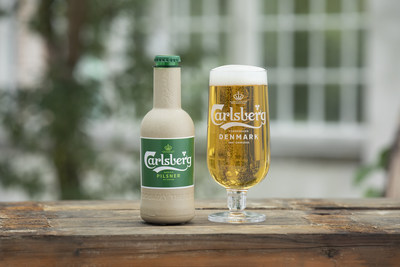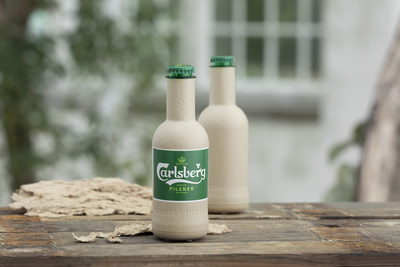
Carlsberg Group is on the road to creating the world’s first “paper” beer bottle made from sustainably-sourced wood fibres that is both 100% bio-based and fully recyclable.
They unveiled two new research prototypes of its Green Fibre Bottle, which are the first ‘paper bottles’ to contain beer.
Carlsberg also announced it has been joined by other leading global companies who are united in their vision of developing sustainable packaging through the advancement of paper bottle technology.
These developments are a continuation of Carlsberg’s sustainable packaging innovation journey and a key part of its sustainability programme,
Together Towards ZERO, including its commitment to ZERO carbon emissions at its breweries and a 30% reduction in its full value chain carbon footprint by 2030.
The two new research prototypes are made from sustainably-sourced wood fibre, are fully recyclable and have an inner barrier to allow the bottles to contain beer.
One prototype uses a thin recycled polyethylene terephthalate (PET) polymer film barrier and the other a 100% bio-based PEF polymer film barrier.
These prototypes will be used to test the barrier technology as Carlsberg seeks a solution to achieve their ultimate ambition of a 100% bio-based bottle without polymers.
“We continue to innovate across all our packaging formats and we are pleased with the progress we’ve made on the Green Fibre Bottle so far.
“While we are not completely there yet, the two prototypes are an important step towards realising our ultimate ambition of bringing this breakthrough to market.

“Innovation takes time and we will continue to collaborate with leading experts in order to overcome remaining technical challenges, just as we did with our plastic-reducing Snap Pack.” Myriam Shingleton, Vice President Group Development at Carlsberg Group.
Carlsberg will now be joined by The Coca-Cola Company, The Absolut Company and L’Oréal in a paper bottle community.
Carlsberg’s focus on sustainable packaging innovations is not new. In 2018, the Danish brewer launched a number of packaging innovations including recycled shrink film, greener label ink and the innovative ‘Snap Pack,’ which replaces the plastic wrapping around its six-packs with a solution that instead glues cans together.

